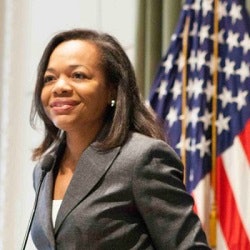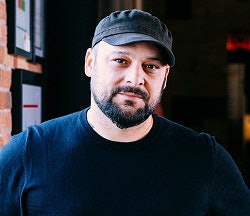WASHINGTON – Anti-Semitism and racism are contemporary as well as historical, and everyone from academics and religious leaders to the public and police should stand against the White supremacy that fuels them, speakers said Wednesday at a Georgetown University conference at the National Press Club.
White supremacy, White separatism and White nationalism are different names for the same ideology that promotes hatred of and incites violence against Blacks, Jews and other ethnic and religious minorities, keynote speaker Kristen Clarke told more than 200 people attending “Contemporary White Supremacy in America: What Are Its Links to the Nazi Past?” presented by university’s Center for Jewish Civilization.
 Kristen Clarke
Kristen Clarke“White nationalism should be of profound concern to all Americans because it affects all communities and tears at the fabric of our nation,” said Clarke, president and executive director of The National Lawyers’ Committee for Civil Rights Under Law.
Clarke, who had testified Tuesday at a hearing on White supremacy before the House judiciary committee, said her nonpartisan civil rights and racial justice organization fights nationally against a “scourge of hate” that has roots in the nation’s “dark and sordid history of racial violence.”
Reports of hate crimes in the nation have increased since 2016, and Clarke pointed the finger at President Donald J. Trump. From court appointees and immigration policies to a proposed travel ban and threats to close the Southern border, his words and deeds “feed into a culture of animus that Black and Brown communities face today,” she said.
Citing several high-profile hate crimes against Blacks, Muslims and Jews in recent years – including the mass shooting last fall at a Pittsburgh synagogue and suspicious fires at three historically Black churches in Louisiana in recent weeks – Clarke said the federal government must “step up in moments like this to hold the perpetrators accountable.”
After pressure from Clark’s organization, Facebook changed its policy regarding a ban on White-supremacist content. Now, Clarke said, White nationalist and White separatist content are banned in the same manner that White supremacist content is prohibited.
Clarke’s organization also fights White supremacy on college campuses, she said, noting their support of American University student Taylor Dumpson, who resigned last year as the school’s first Black female student government president after several racist incidents on campus and harassment and threats by White supremacists on social media.
Clarke’s group helped Dumpson win a legal settlement in December when they, along with the Washington Lawyers’ Committee and pro bono counsel Kirkland & Ellis LLP, sued Andrew Anglin. The suit alleged that Anglin, publisher of The Daily Stormer neo-Nazi website, posted Dumpson’s personal information online and urged his White-supremacist followers to harass her.
White supremacists reserve a special contempt for institutions of higher education, while at the same time claiming the right to recruit on campuses and spread their propaganda in hopes of gaining a legitimacy that the college setting may confer, said Dr. Norman Goda, the Norman and Irma Braman Professor of Holocaust Studies at the University of Florida.
 Christian Picciolini
Christian Picciolini“They hate the American university,” Goda said during a panel discussion about Nazi anti-Semitism from 1939 to the alt-right. “They hate what they see as a Jewish agenda that has promoted everything from cultural relativism to the fundamental equality of all people. They see the university as sort of the heart of the problem that they see going on in the United States right now.”
And what they perceive is White genocide or displacement, said Goda.
“They look at college campuses and see something threatening to them,” he said. “Ethnic studies programs. Gender studies programs. I think they see things like Black Lives Matter, rhetorical attacks on police, these sorts of things. And immigration, which they see as the continuation of something, that White minority status is a certainty. And they see this as sort of an apocalyptic moment.”
And so, the Internet has become not only a forum for propaganda and hate crimes, but also a tool for recruiting, training, organizing and mobilizing White supremacists, speakers said in a panel discussion about White power movements, the holocaust and contemporary anti-Semitism.
White supremacists usually are not raised with such views, but as boys and teens are vulnerable to recruitment – particularly online through gaming platforms and social media, said panelist Christian Picciolini, a former neo-Nazi skinhead who was recruited at the age of 14. He later wrote a book about life in the group and leaving it, and founded Life After Hate, a nonprofit dedicated to countering racism and violent extremism.
White-supremacist recruiters target boys in their early teens through the age of 18, youngsters who tend to have experienced abuse or some other trauma, abandonment, dysfunctional family relationships, social isolation, lack of self-confidence, extreme privilege – any of which could make them susceptible to ideological indoctrination, said Picciolini.
They are lured by senses of identity, community and purpose, three things they lack without necessarily realizing it, he said.
The youth are gradually desensitized to violence toward a particular group or groups as they are brainwashed, he said, and they typically end up with a variation on the myths that Jews are the “elite puppetmaster” and Black people and other minorities are “the purveyors of chaos, living in criminality and disrupting society.”
Such early programing could be seen in how young German boys were given tasks such as delivering food to Nazi soldiers who were killing Jews during the Holocaust, which “helped frame their consciousness” about anti-Semitism and White supremacy, said Rev. Patrick Desbois, the center’s Braman Endowed Professor of the Forensic Study of the Holocaust.
As founder of Yahad-In Unum, Desbois interviewed more than 4,000 eyewitnesses to the Nazi execution of Jews and Roma and in 2015 launched an initiative to investigate ISIS genocide of the Yazidi.
Picciolini said White-supremacist hatred is global, and “it’s only a matter of time before White nationalists and ISIS begin working together.”
Solving the problem doesn’t lie in ideological persuasion or law enforcement, he added, but in helping White supremacists experience an emotional change through replacing negative pathways with positive ones.
LaMont Jones can be reached at [email protected]. You can follow him on Twitter @DrLaMontJones



















